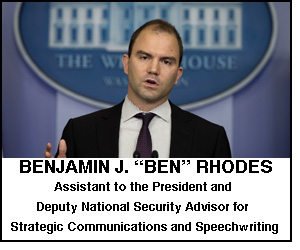 In its stories on January 5, 2017, and also on January 10, 2017, The Washington Free Beacon for-profit online newspaper has reported that “Ben Rhodes, a White House deputy national security adviser who led the administration’s efforts to mislead Congress about the terms of the Iran nuclear agreement, is under [Congressional] scrutiny in the wake of disclosures he was declined interim clearance status by the FBI in 2008 …”
In its stories on January 5, 2017, and also on January 10, 2017, The Washington Free Beacon for-profit online newspaper has reported that “Ben Rhodes, a White House deputy national security adviser who led the administration’s efforts to mislead Congress about the terms of the Iran nuclear agreement, is under [Congressional] scrutiny in the wake of disclosures he was declined interim clearance status by the FBI in 2008 …”
Under the circumstances, Congress is properly trying to determine if Rhodes was cleared by the FBI to receive access to national security information. Specifically, Congress wants to know if Rhodes had been denied an interim security clearance.
Being denied a security clearance after an appropriate background investigation has been completed and adjudicated is different from simply not applying for the security clearance. Clearances are generally denied when the applicant is unsuitable to hold the clearance.
In a preceding OpenCdA post, we discussed what “suitability” means.
“Suitability” refers to a person’s identifiable character traits and conduct sufficient to decide whether employment or continued employment would or would not protect the integrity or promote the efficiency of the agency or company. “Suitability” is different from meeting or even exceeding the necessary qualifications to do the job. “Suitability” seeks answers to the questions, “Is this applicant a good fit for our agency or company ? Will this applicant’s conduct and work product faithfully represent the values and principles of this agency or company?”
Our OpenCdA post dated July 11, 2015, entitled “OPM Hack – The Real Damage” explained the damage done to our national security by the remarkably extensive data penetration into the Office of Personnel Management’s files on approximately 22 million present and former federal employees.
Our post explained that the data stolen wasn’t just the usual routine data that is the stuff of criminal identity theft. It also included data in investigative files, the data reported by background investigators to officials so experienced security clearance adjudicators could determine an applicant’s suitability to have placement and access to national security information.
Those investigative reports obtained during the OPM hack could easily and appropriately have included credible derogatory information, information used in the decision to deny a national security clearance to an applicant. “Credible derogatory information” is the investigator’s term for dirty laundry, the stuff in our backgrounds we don’t want anyone else to know about. It is information that could be used by skilled human intelligence case officers to identify, assess, recruit, and control improperly-cleared government employees to reveal national security information to our adversaries.
The Congressional inquiry to the FBI about the Rhodes background investigation is a case in point to remind us of the importance of the importance of background investigations and of the need to properly secure personal information submitted by an applicant and developed during the background investigation.
FBI Director Comey’s response to Congressmen Franks’ and Bridenstine’s letter will give us a peek at how seriously the Obama administration took the FBI’s counterintelligence efforts to protect the nation’s secrets.

If he was denied clearance and yet allowed to access classified national security information, what are the consequences?
Comment by Gary Ingram — January 10, 2017 @ 8:35 pm
Gary,
Administratively, there would be effectively no adverse consequences to him as long as he did his job and did not make unauthorized disclosure of the information to people not authorized by the President to have it. As long as Rhodes did nothing to embarrass the President or his superiors in the Executive Office of the President, it simply wouldn’t matter to anyone except the counterintelligence people in the Intelligence Community who actually do care about national security.
It’s the unauthorized disclosure of national security information, not the authorized disclosure, that get’s people into trouble. When it’s politically expedient, national security information is disclosed to all sorts of scumbags including skewsmedia. Here’s an example.
If Rhodes was denied a clearance and the denial was overridden by higher-ups in the political food chain at the White House, it was not the first time and it won’t be the last time.
Comment by Bill — January 11, 2017 @ 6:00 am